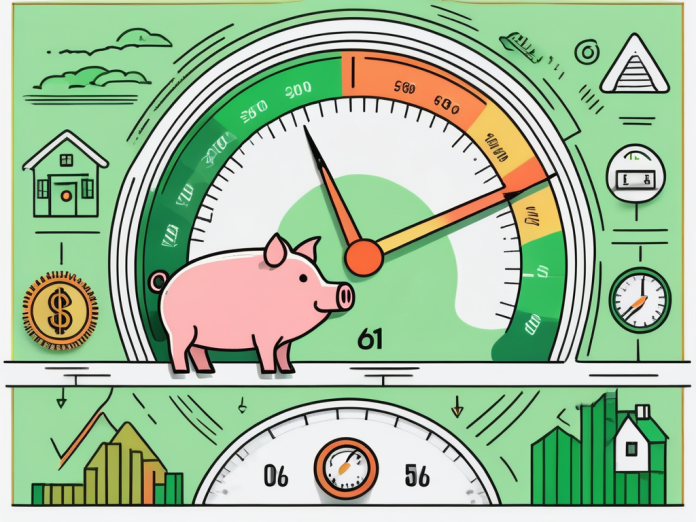If you’ve ever applied for a loan or a credit card, then you’re probably already familiar with the concept of a credit score. But what exactly is a credit score? How does it work? And most importantly, what can you do to improve yours? In this article, we’ll dive into the world of credit scores and explore strategies that will help you boost your creditworthiness.
What is a Credit Score?
At its core, a credit score is a three-digit number that lenders use to assess your creditworthiness. In other words, it indicates the level of risk you represent as a borrower. A higher credit score generally signifies that you’re a responsible borrower who is more likely to repay your debts on time. Conversely, a lower credit score could suggest that you may have difficulty meeting your financial obligations.
The Basics of Credit Scores
Credit scores are generated by credit reporting agencies, such as Equifax, Experian, and TransUnion. These agencies collect data on your borrowing and repayment history, including information about your credit cards, loans, and payment patterns. Using this data, they evaluate your creditworthiness and assign you a credit score. The most common credit scoring model is the FICO score, which ranges from 300 to 850. The higher your score, the better your creditworthiness.
Factors Influencing Your Credit Score
Your credit score is influenced by several key factors, including:
- Payment history: This is the most significant factor, accounting for about 35% of your overall credit score. Making payments on time consistently is crucial for maintaining a good credit score.
- Credit utilization: This refers to the percentage of your available credit that you’re using. Keeping your credit utilization ratio below 30% is generally recommended.
- Length of credit history: The longer your credit history, the more favorable it reflects on your creditworthiness.
- Credit mix: Lenders like to see a mix of different types of credit, such as credit cards, installment loans, and mortgages.
- New credit: Opening multiple new accounts within a short period can be seen as a red flag to lenders.
While these factors play a significant role in determining your credit score, it’s important to note that they are not the only factors considered. Other factors, such as the total amount of debt you owe, the age of your accounts, and any negative items on your credit report, can also impact your creditworthiness.
Furthermore, it’s worth mentioning that credit scores can vary slightly between different credit reporting agencies. Each agency may have its own scoring model or use a variation of the FICO scoring model. It’s a good idea to regularly check your credit reports from all three agencies to ensure accuracy and identify any potential errors that could negatively affect your credit score.
The Importance of a Good Credit Score
Now that you understand what a credit score is and how it’s calculated, let’s explore why it matters.
Credit Scores and Loan Approval
When you apply for a loan, whether it’s a mortgage, car loan, or personal loan, lenders assess your creditworthiness based on your credit score. A high credit score increases your chances of getting approved for the loan, while a low credit score may result in rejection or higher interest rates.
Impact on Interest Rates
Aside from loan approval, your credit score also affects the interest rates you’ll be offered. A good credit score can potentially save you thousands of dollars in interest over the life of a loan, as lenders are more likely to offer lower rates to borrowers with excellent credit.
Analyzing Your Credit Report
Understanding your credit score is just one piece of the puzzle. To truly take control of your credit, you need to analyze your credit report.
How to Obtain Your Credit Report
You can obtain a free copy of your credit report from each of the major credit reporting agencies once every twelve months. Visit AnnualCreditReport.com to request your reports and review them for accuracy.
Understanding Your Credit Report
When reviewing your credit report, look for any errors or discrepancies. Common mistakes include incorrect personal information, accounts that aren’t yours, or outdated negative information. Dispute any errors you find to ensure that your credit report accurately reflects your creditworthiness.
Strategies to Improve Your Credit Score
If your credit score needs a boost, don’t worry. There are several strategies you can implement to improve it.
Paying Bills on Time
The most effective way to improve your credit score is to consistently make payments on time. Set up automatic payments or reminders to ensure you never miss a due date.
Reducing Debt
Lowering your overall debt can significantly impact your credit score. Make a budget, cut unnecessary expenses, and prioritize paying down your debts.
Limiting New Credit Inquiries
Each time you apply for new credit, it results in a “hard inquiry” on your credit report, which can temporarily lower your score. Limit the number of credit inquiries by being selective about the credit you apply for.
Maintaining a Healthy Credit Score
Now that you’ve taken the necessary steps to improve your credit score, it’s essential to maintain it over time.
Regular Monitoring and Review
Keep a close eye on your credit score and credit report, monitoring for any changes or inaccuracies. Regularly reviewing your credit will help you detect and address any issues promptly.
Good Financial Habits
In addition to paying bills on time and reducing debt, practice good financial habits. This includes maintaining a healthy credit utilization ratio, avoiding excessive new credit applications, and refraining from closing old, unused accounts.
Dealing with Credit Score Myths
Don’t fall for common credit score myths. For instance, closing a credit card account might not always be beneficial, as it could impact your credit utilization ratio. It’s crucial to separate fact from fiction and make informed decisions based on accurate information.
Improving your credit score is a process that takes time and discipline. By understanding the factors that influence your credit score and implementing the strategies outlined in this article, you’re well on your way to achieving a better credit score. With an improved credit score, you’ll have more financial opportunities and peace of mind knowing you’re on the path to financial success.




























